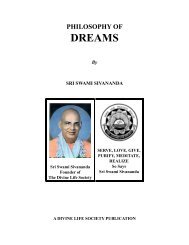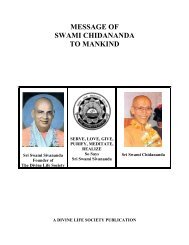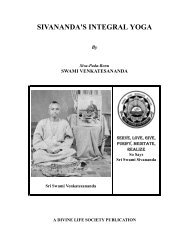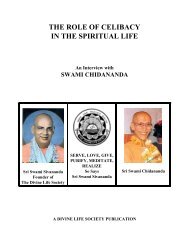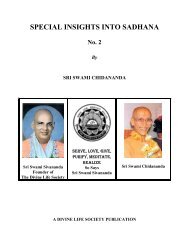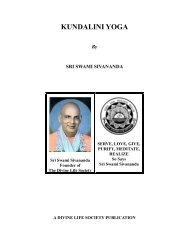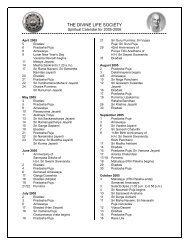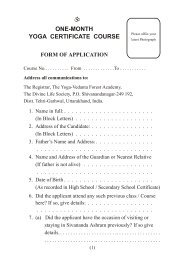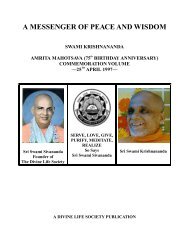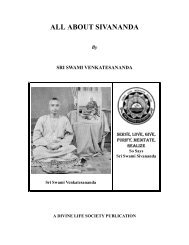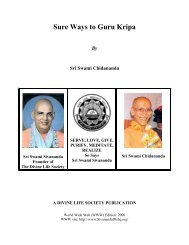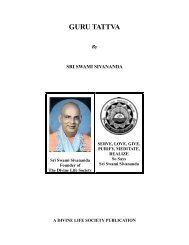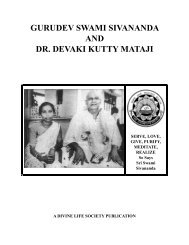THE GITA VISION - The Divine Life Society
THE GITA VISION - The Divine Life Society
THE GITA VISION - The Divine Life Society
You also want an ePaper? Increase the reach of your titles
YUMPU automatically turns print PDFs into web optimized ePapers that Google loves.
<strong>THE</strong> <strong>GITA</strong> <strong>VISION</strong><br />
By<br />
SRI SWAMI CHIDANANDA<br />
Sri Swami Sivananda<br />
Founder of<br />
<strong>The</strong> <strong>Divine</strong> <strong>Life</strong> <strong>Society</strong><br />
6(59(/29(*,9(<br />
385,)
First Edition: 1992<br />
World Wide Web (WWW) Reprint : 1998<br />
WWW site: http://www.rsl.ukans.edu/~pkanagar/divine/<br />
This WWW reprint is for free distribution<br />
© <strong>The</strong> <strong>Divine</strong> <strong>Life</strong> Trust <strong>Society</strong><br />
Published By<br />
<strong>THE</strong> DIVINE LIFE SOCIETY<br />
P.O. SHIVANANDANAGAR—249 192<br />
Distt. Tehri-Garhwal, Uttar Pradesh,<br />
HIMALAYAS, INDIA.
PUBLISHERS’ NOTE<br />
During the Sivananda Ashram Sadhana Week, which was held in September 1991 prior to<br />
his 75th birth anniversary, H.H. Sri Swami Chidanandaji Maharaj was asked to give a series of<br />
lectures on the philosophy and practice of the Bhagavad Gita. In this series, Swamiji concentrated<br />
on the first three chapters and this core portion of the lectures is now being offered to the reading<br />
public under the title “<strong>The</strong> Gita Vision.”<br />
Over the years, in his talks given throughout India and the world, revered Swamiji has<br />
constantly quoted from the Gita. Years of reflecting over its message, and, still more important,<br />
putting its precepts into practice in his own life, has made this scripture into a living reality for him.<br />
As a result, the message and vision of the first three chapters of the Gita, delivered in Swamiji’s<br />
unique style, had a profound impact upon the attentive audience.<br />
We believe that this inspiring message and vision will be of equal benefit to all devotees of<br />
the Gita, who, after reading this booklet, will return to the Gita with a fresh appreciation of its<br />
timely and life-giving message.<br />
Sivananda Ashram<br />
Sri Krishna Jayanti<br />
August 21, 1992<br />
<strong>THE</strong> DIVINE LIFE SOCIETY<br />
iii
PREFACE<br />
<strong>The</strong> Srimad Bhagavad Gita contains the quintessence of the wisdom of the Vedas.<br />
<strong>The</strong>refore, one who has understood the Gita has understood the essence of the Vedas. Gurudev, Sri<br />
Swami Sivanandaji Maharaj, insisted that you should get a knowledge of the Bhagavad Gita. For<br />
then you will get a knowledge of yourself, and of how to overcome dejection, despair, hopelessness<br />
and a total breakdown of self-confidence by determining to follow the instructions of the <strong>Divine</strong>, by<br />
fulfilling God’s Will in your life. You will know how to overcome attachment, delusion and<br />
faint-heartedness, to cast them aside and to stand up and engage in self-culture and self-mastery.<br />
<strong>The</strong> Gita starts in defeatism but ends in victory. <strong>The</strong> final verse firmly affirms victory and<br />
fulfilment. <strong>The</strong> Gita begins with Arjuna’s unwillingness to face the call of life, the call of duty. He<br />
says: “I would much rather take a beggar’s bowl and wander over the earth than engage in battle.”<br />
And when Krishna starts to correct him, he tries to argue with Krishna and prove Him wrong.<br />
Arjuna tells Krishna that He is asking him to do something very seriously wrong and sinful that will<br />
have dire consequences. But Krishna makes him realise that what he thinks to be a wise<br />
understanding about life has at its bottom deluded attachment, moha. And once Arjuna says, “I now<br />
realise that I have been thinking in a wrong manner, I shall follow Your teaching, please teach me,”<br />
then everything proceeds well. Even in the midst of the battle, when Arjuna is unable to withstand<br />
the onslaught of Bhishma, Krishna Himself takes up a wheel of the chariot, rathanga, as His<br />
chakra.<br />
So, once you pledge obedience to the <strong>Divine</strong> Will, the <strong>Divine</strong> never lets you down. It helps<br />
you even in the direst of circumstances. Even when defeat seems to be one hundred percent sure, the<br />
<strong>Divine</strong> will not allow you to be defeated. It fights on your behalf, takes up arms, because your<br />
pledge for obedience is complete. And to one who has thus pledged total obedience to the Lord’s<br />
Will, there is no defeat. It is all victory.<br />
<strong>The</strong> very incident of the Srimad Bhagavad Gita is an indication of what life should be, in<br />
what manner it should be lived. That is, we should allow the <strong>Divine</strong> to guide the chariot of our life.<br />
Throughout the Gita, the position of Lord Krishna is of one who guides Arjuna’s chariot. <strong>The</strong><br />
chariot of life, throughout this great battle, is guided by Lord Krishna. Arjuna only goes on doing<br />
his duty, fulfilling his kartavya karma. It is Krishna Who takes the chariot wherever it is right for<br />
Him to take it.<br />
This is the very clear indication of the Srimad Bhagavad Gita incident, the episode and the<br />
outcome. It is a clear indication to the seeker who is sincerely dedicated to the divine ideal to allow<br />
the <strong>Divine</strong> Will to guide him throughout, until victory is attained and victory is proclaimed.<br />
If you look at the Gita in this way, then you will understand it in a totally different way. You<br />
will know what its teachings mean to you personally as seekers engaged in the battle of life and as<br />
seekers who have to somehow overcome and attain the supreme Goal. You will understand its<br />
relevance to yourself. And thus understanding, the benefit you derive from the Gita will be totally<br />
different. It will be of practical spiritual benefit.<br />
iv
May Lord Krishna’s grace enable you to understand the Gita in this intimate, personal way<br />
and be benefited by it, so that you attain the Goal Supreme!<br />
Sivananda Ashram<br />
Sri Bhagavadgita Jayanti<br />
December 17, 1991<br />
Swami Chidananda<br />
Om<br />
INTRODUCTION<br />
<strong>The</strong> philosophy of the Srimad Bhagavad Gita is the philosophy of the Upanishads put into<br />
practice. It is also an Upanishad in the form of a prescription for tapatraya and bhavaroga (the<br />
threefold afflictions of man and the disease of transmigration). <strong>The</strong> philosophy of the Gita is a<br />
philosophy of shaking away weakness and bondage to darkness and ignorance, a philosophy of<br />
liberating yourself from “I and mine” and attachments, of being bold and brave enough to see the<br />
truth as it is, and then commencing once again the journey towards the ultimate state of a liberated<br />
consciousness.<br />
It is the practice of the Gita that gradually removes from one’s interior the ignorance of the<br />
reality of our situation. <strong>The</strong> sadhana of the Gita is the time-honoured methods evolved, formulated,<br />
perfected and handed down to us as the great science of Yoga. But it goes a step further. <strong>The</strong><br />
sadhana of the Gita is also a prescription suited to each and every individual. It is an integrated<br />
sadhana of karma, bhakti, dhyana and jnana. Overemphasis is not laid upon any one. All are<br />
important. All have to be synthesised. But, most important, they all have to be put into practice in<br />
daily life.<br />
<strong>The</strong> practice of the Bhagavad Gita is not in a hermitage nor in a secluded place aloof from<br />
mankind; it is not in a forest where the Upanishads were realised and put down for our benefit. <strong>The</strong><br />
sadhana of the Gita is commensurate with your life itself. <strong>The</strong> Gita-sadhana is not something to be<br />
separated from life; it is something which has to be made part and parcel of life. Gita-sadhana and<br />
right living are synonymous. Right living is Gita-sadhana. Gita-sadhana is right living.<br />
Gita-sadhana and life are to go together hand in hand and become one. <strong>The</strong>y have to merge into<br />
one.<br />
That is the type of life that will ultimately raise you from the delusion of unrealities to the<br />
clear perception of the Reality. It is a Gita-pattern of life that will take you from the darkness of<br />
ignorance into the light of supreme divine wisdom. It is Gita integrated into your practical<br />
day-to-day life that will ultimately take you from death, mortality and bondage to this wheel of<br />
rebirth to a supreme realm of immortality and everlasting eternal life.<br />
v
CONTENTS<br />
PUBLISHERS’ NOTE ......................................iii<br />
PREFACE. ............................................iv<br />
INTRODUCTION .........................................v<br />
<strong>The</strong> Philosophy Of <strong>The</strong> Bhagavad Gita ..............................1<br />
<strong>The</strong> Stage Is Set ..........................................2<br />
Man’s Extremity Is God’s Opportunity ..............................2<br />
<strong>The</strong> Lord Rebukes Arjuna .....................................3<br />
<strong>The</strong> Reason For Lord Krishna’s Rebuke .............................4<br />
<strong>The</strong> Teachings Begin .......................................6<br />
Knowledge And Action ......................................7<br />
Action Cannot Be Avoided ....................................8<br />
Arjuna’s Affliction. ........................................9<br />
Arjuna’s Delusion ........................................10<br />
Established In <strong>The</strong> Inner Wisdom ................................12<br />
<strong>The</strong> Central Declaration Of Vedanta ...............................13<br />
Living <strong>The</strong> Gita Vision ......................................14<br />
vi
<strong>THE</strong> <strong>GITA</strong> <strong>VISION</strong><br />
<strong>THE</strong> PHILOSOPHY OF <strong>THE</strong> BHAGAVAD <strong>GITA</strong><br />
<strong>The</strong> philosophy of the Bhagavad Gita is no other than the philosophy of the Upanishads. But<br />
in one respect it has gone a step further, in that the philosophy of the Bhagavad Gita has brought the<br />
philosophy of the Upanishads from the forest dwellings of the rishis and the munis, from the<br />
hermitages of tapasvis and sannyasis and has given it a central place in the home of the grihastha in<br />
samsara, in the market place of vyavahara, worldly life, so that the Gita is upanishad-darsan in<br />
practice. In the Gita we have the Upanishadic wisdom applied. In the Gita we have the translation of<br />
the adesa (command) and sandesa (instruction) of the<br />
Upanishads into daily life. To teach how the Upanishads can actually be practised, how the<br />
Upanishads can be made the basis of our daily life, is the purpose of the Bhagavad Gita.<br />
<strong>The</strong> philosophy of the Srimad Bhagavad Gita deals with the situation of the individual<br />
pilgrim soul upon this earth plane, in the midst of the very vexing problems that constitute an<br />
inevitable part of the individual’s life. It takes the life of the jivatma in this prapancha, beset by the<br />
dvandvas, love and hate, like and dislike, attachment and repulsion. It takes the life of the jivatma<br />
faced with the situation of an inner, essential conflict between what one would like to do and what<br />
one is required to do, between one’s sentiments, emotions and attachments and one’s duty in one’s<br />
station in life. It takes the life of an individual trying to grapple with this inner conflict of bhavana<br />
(feeling) and kartavya (duty), this inner conflict of the sreya (good) and the preya (pleasant), this<br />
inner conflict of dharma, which is very difficult, and the easier way.<br />
It provides the necessary strength to the individual by enlightening him with the hidden<br />
reality of the situation. Because of his insufficient understanding, his lack of proper perspective, the<br />
individual takes the situation to be what it appears to be and does not try to analyse it beyond and<br />
behind the surface appearance, nor try to understand it as it is in essence. He thus takes to a certain<br />
course of action which is contrary to his own highest welfare and supreme good and which is also<br />
contrary to the good of the world in which he lives.<br />
<strong>The</strong> Gita, by bringing into our antahkarana, into our minds and hearts and intellects, the<br />
light of proper reasoning, correct perception and right understanding, liberates us from the delusion<br />
that brings about such conflicts, such inner two-ways pulls. When one understands a situation<br />
properly and one sees things clearly, one is then able to understand, to know, what the essence of the<br />
situation is in fact, not what it appears to be. How does the Gita do this<br />
<strong>The</strong> philosophy of the Gita is not just a declaration of experienced truth. It is not merely an<br />
expounding of a certain revelation. But, from start to finish, it is dialectic in its method of<br />
approaching this question of the individual in this universe, of his situation in life and the various<br />
problems and conflicts that surround him as he tries to execute this journey of life. It takes on an<br />
approach that is dialectic, in that every Chapter constitutes the imparting of certain teachings. It is a<br />
teacher teaching a student. It is like a class lesson and the teacher takes great pains to clarify<br />
intricate points and to answer all the questions of the student, to remove all doubts as the student<br />
goes on asking questions and placing doubts before him.<br />
1
<strong>THE</strong> <strong>GITA</strong> <strong>VISION</strong><br />
<strong>The</strong>refore, the philosophy of the Gita is an educative process of bringing the individual soul<br />
from a state of wrong understanding, a state of a mixed-up interior, a state of confusion, into a<br />
higher state of right understanding, a clarity of perception and vision and a very clear interior. <strong>The</strong><br />
episode of the Gita sets the stage for this educative process of a teacher teaching one with lesser<br />
knowledge. In this process, the teacher attempts to lift the student up into the state of a fullness of<br />
knowledge that characterises the teacher himself. <strong>The</strong> teacher makes the student see through the<br />
teacher’s eyes; whereas, before, the student was trying to look at things only through his own eyes.<br />
<strong>THE</strong> STAGE IS SET<br />
<strong>The</strong> stage is set in such a way that Arjuna, the leader of the army of the Pandavas in the<br />
immanent Mahabharata war (the purpose of which was to decide conclusively whether adharma<br />
would go on prevailing absolutely unchecked or whether ultimately it was to be uprooted and<br />
dharma established) became the occasion for the Gita teachings. For, at this juncture, this chief, the<br />
prince and warrior Arjuna, the principal personality there, falls into a state of terrible inner conflict.<br />
He is overcome by numerous emotions and comes to a state bordering on a total collapse of his<br />
entire being_physically, physiologically and psychologically.<br />
Physically, Arjuna becomes incapable of even standing. He is overcome by great fear and<br />
confusion. And the symptoms of this acute inner state, this psychological state of stress, of tension<br />
and terrible conflict, manifests as palpitation of his heart, profuse perspiration, trembling in all his<br />
limbs, drying up of his tongue, parching of his throat, tears welling up from his eyes and dizziness.<br />
<strong>The</strong> world is spinning round. He is not able to stand and his bow slips from his hand and falls to the<br />
ground. He himself also falls to the ground, because in this state of physical collapse brought about<br />
by a nervous breakdown, by an acute intensity of emotional conflict that has gone beyond a certain<br />
stage of toleration, his legs are not able to carry him anymore. <strong>The</strong>re is a total breakdown,<br />
psychological, physiological and physical.<br />
MAN’S EXTREMITY IS GOD’S OPPORTUNITY<br />
It is only when a person is in greatest danger that he begins to shout and call for help: “Help!<br />
Help! Help! Save me! Save me! If you do not save me, I am lost!” In that state of dire extremity, he<br />
looks for someone to come and rescue him. He calls aloud and is prepared to do anything, because<br />
he wants to save himself_"Whatever you say, I will do." When one’s resources are completely at an<br />
end and one realises one’s absolutely helpless state, then, like a man drowning, knowing he can no<br />
longer rely upon himself or save himself, one reaches up and calls out for help from the outside.<br />
In this way, perhaps certain heavy sorrows, extremely dire situations, catastrophes or<br />
calamities become the turning point of one’s life. From a feeling of self-sufficiency, from a basic<br />
egoistical arrogance of feeling that one is capable of doing everything in this world, one comes into<br />
a sudden realisation that here is something which one cannot face.<br />
As long as the jivatma is in a state of, as they say “hypervitaminosis I,” an oversupply of the<br />
vitamin “I”, ahamkara (egoism), the jivatma is lost, because ahamkara is the first product of avidya<br />
or ajnana. It contains the essence of individuality. And this individuality is a state of alienation<br />
from one’s eternal oneness, one’s unity with the <strong>Divine</strong> Reality. And this state of alienation from<br />
2
MAN’S EXTREMITY IS GOD’S OPPORTUNITY<br />
our divine Source, our divine cosmic Origin, which deprives us completely of the awareness of our<br />
essential svarupa as amsas (parts) of the supreme paramatman, is the root cause of all the<br />
tapatrayas (sufferings or afflictions) of samsara and prapancha (worldly life).<br />
If you wish to commence your liberation from total bondage in this net of ahamkara and<br />
mamakara (I-ness and mine-ness), attachment, selfishness and an identification with these inner<br />
principles of a separate, finite, little ego-personality, then the first thing needful is to realise and<br />
recognise the insufficiency of this little ego-principle, which up till that moment was to you the<br />
centre of your universe, the most important and precious thing in the world, the dearest thing, for<br />
which, to protect its interest, you have been prepared to fight with anyone.<br />
When this ego-principle is recognised in its true colours, that it, as a matter of fact,<br />
constitutes your real problem, that it is the factor that holds you in thraldom, in bondage, then you<br />
realise that if you rely upon it, you will ultimately be left in the lurch. When that realisation begins<br />
to dawn and you start looking up for a higher Being, a higher Power to take you out of this<br />
predicament which has been brought about by giving over-importance to the ego, then commences<br />
your liberation.<br />
Thus the all-knowing Lord-of all existence, anantakoti brahmanda nayaka prabhu<br />
bhagavan (God, the Lord and the Ruler of millions and billions of universes), Who is the inner<br />
prompter, sarvantaryami, in order to give the highest wisdom teachings for all mankind, brings<br />
about this conflict situation and puts Arjuna into a fix, like Hamlet, not knowing what to do.<br />
Arjuna actually does know what he has to do; he has come fully prepared for it. But<br />
suddenly, when the attachments of the sentimental and emotional aspect of his personality begin to<br />
invade his consciousness and begin to overcome him, overwhelm him, then he finds himself in a<br />
terrible fix. Suddenly there is this clash between the clear thinking intelligence, the rational aspect<br />
of Arjuna, and the overwhelming and very powerful emotional and sentimental aspect of Arjuna.<br />
And the sentimental aspect of Arjuna is now trying to undo everything. And in this state of fix, not<br />
able to decide what to do, this normally clear thinking young prince, who had come with no doubts<br />
about what he had to do that day, cries aloud for help. <strong>The</strong>y say: “Man’s extremity is God’s<br />
opportunity.”<br />
<strong>THE</strong> LORD REBUKES ARJUNA<br />
And so, the Gita jnana-upadesa starts from this human situation: the ultimate extremity of a<br />
helpless individual calling for intervention from the <strong>Divine</strong>. And the <strong>Divine</strong> speaks and says: “What<br />
is this that has happened to you This is the time for viveka and vichara, not sentiment, bhavana.<br />
<strong>The</strong>re is a maryada (social norm) of every given situation, a time and a place. And at this time, the<br />
maryada requires that you must exercise your discrimination, your right thought, your viveka and<br />
vichara. This is not a time for indulging in sentiment. Your heart has given way to a completely<br />
wrong factor in your personality make-up. That factor has no business here. Intruding at a time and<br />
place which is not its territory, it is working havoc with you; it has taken away your strength.<br />
Vichara, viveka, determination and will-power constitute the strength of an individual. Silly<br />
sentiment, uncontrollable emotion, constitute a weakness of an individual.” <strong>The</strong>refore the Lord<br />
3
<strong>THE</strong> <strong>GITA</strong> <strong>VISION</strong><br />
uses the word hridaya daurbalya (weakness of heart). “This is not the right thing. Stop it! Give up<br />
this inner weakness. Stand up and fight! Be strong!”<br />
That too is the call of the Upanishads: na-ayam atma balahinena labhyah (This Atman<br />
cannot be attained by one who is destitute of strength). And this morning Mahamandalesvar Sri<br />
Swami Vidyanandaji Maharaj spoke about the necessity of strength, heroism, if you are going to<br />
confront the undesirable aspects of your own nature and refuse to yield to their pull. Because Lord<br />
Brahma put an extra portion of rajo guna into the antahkarana of the jivatman, man’s mind and<br />
senses are all outgoing, and to go against this very elemental aspect of one’s nature requires some<br />
special strength. Only such special strength can enable you to dive inward where you can see the<br />
Self, the immortal, eternal, imperishable Self, and attain supreme bliss and immortality.<br />
And so we see that Arjuna’s deep grief and anxiety, his nervous breakdown and physical<br />
collapse, put Lord Krishna into a temporary dilemma, so to speak. Arjuna, the redoubtable,<br />
renowned warrior prince, having requested Krishna to assist him in the war by being his charioteer,<br />
is now behaving in this most unwarrior-like way. To make matters still more embarrassing, the<br />
prince had come with a great determination to join battle with the opposing forces of the Kauravas<br />
and just a few minutes before, with this intention and determination, he had asked Krishna to take<br />
the chariot right to the middle of the battlefield in between the two opposing forces. Thus whatever<br />
is now taking place between Himself and Arjuna is being witnessed by everyone on both sides. And<br />
they must be wondering what the matter is! Arjuna is no longer in the chariot. He is there on the<br />
ground and he seems to be in some peculiar state of agitation. He is making gestures and looking up<br />
to Krishna and then bowing his head.<br />
Krishna must be feeling: “What is this If this had happened when we were still behind the<br />
battle lines, or at least in the midst of the Pandavas, it would have been somewhat better. At least<br />
they would have somehow or other looked upon this with sympathy and understanding, not with<br />
scorn. But now, here we are in front of the enemy forces, and this has happened. Very<br />
embarrassing! I have promised to take him into the battlefield for battle and here he is saying, ‘I<br />
won’t fight.’”<br />
For the moment, as it were, humanly speaking, Krishna was taken aback, nonplussed. He<br />
asks Arjuna: “What has happened to you What is the matter A little while ago you were full of<br />
spirit, full of mettle, and now, in one moment, you have come to this abject condition. From where<br />
has this type of mood come It is not supposed to be in you. You are a warrior, a young person, a<br />
hero. You are courageous, renowned for your prowess and valour. And now this! What has<br />
happened to you This sudden yielding to a negative quality of fear, of anxiety, of cowardice, of<br />
wanting to run away from your duty, is unbecoming of you.”<br />
<strong>THE</strong> REASON FOR LORD KRISHNA’S REBUKE<br />
Why does Krishna, the great World Teacher and very close friend of Arjuna, take such a<br />
seemingly unsympathetic attitude towards His very dear friend <strong>The</strong>y have been close companions,<br />
living together, eating together, and joking together with great familiarity, and yet Krishna rebukes<br />
him sharply. He does not seem to be at all inclined to be sympathetic with him. He does not make<br />
any attempt to understand him. Instead, He says: “What is this Are you not ashamed Get up!”<br />
4
<strong>THE</strong> REASON FOR LORD KRISHNA’S REBUKE<br />
<strong>The</strong>se are not words of sympathy from a friend. Why is He so very sharp, a little intolerant even,<br />
impatient, with Arjuna He has full reason to be.<br />
<strong>The</strong> reason is not far to seek. It is more or less the same way as a Guru is sometimes very<br />
sharp, very unsympathetic and impatiently angry with a disciple. He will never act this way with a<br />
new disciple, with one who has been recently admitted into his fold, who has not had the<br />
opportunity to be in close contact with him and to imbibe, over a long period of time, his upadesa<br />
and adesa (teachings and instructions). But, he will act this way with a disciple who has been living<br />
with him for years and years and who has had the opportunity over a long period of time to be in<br />
constant contact with him, to have heard his upadesa a hundred times and yet in spite of this<br />
behaves in a different manner.<br />
So, in effect, Lord Krishna says: “Have all my efforts on you been wasted Is that what you<br />
are trying to demonstrate now, that your association with Me, your discipleship, and all that I have<br />
tried to teach you is so much waste, useless Has it been of no value, that you demonstrate this<br />
foolish behaviour at this point in your career” For, through thick and thin, rain and shine, ups and<br />
downs, good fortune and misfortune, Arjuna had long been in contact with Lord Krishna. And this<br />
contact had not only brought forth Lord Krishna’s wisdom teachings to Arjuna but also to Kunti,<br />
Draupadi and all the Pandava brothers.<br />
For a discerning and wise person, something said once should be enough. Perhaps due to a<br />
weakness of memory he may forget the first time, but if it is said twice, then that should be enough.<br />
It is only impossible people who will never imbibe it, no matter how many times you give them<br />
good advice. But the Pandavas were not like that. <strong>The</strong>y were sattvic people. <strong>The</strong>y valued the<br />
company of Lord Krishna. <strong>The</strong>y valued His teachings. But in spite of that, at this juncture, when all<br />
the satsang and sravana that Arjuna had done should have come to his aid and helped him, he was<br />
acting like this!<br />
<strong>Life</strong> after life, the jiva comes into this earth plane to progress in knowledge, expand in<br />
wisdom, to learn, to educate itself. Each life span is an opportunity given by God for it to learn,<br />
sometimes the easy way, sometimes the hard way, but always to learn. Gurudev used to say that this<br />
world is a great university for evolution into divine perfection. <strong>Life</strong> is the great teacher. All the<br />
experiences one encounters in life are an educative process. <strong>The</strong>y come with lessons, valuable<br />
lessons. Nothing is empty of valuable content.<br />
<strong>The</strong>refore, God Himself will become impatient when He has constantly tried to teach the<br />
jiva in so many ways, life after life, and still the jiva manifests obduracy and an asinine obstinacy by<br />
refusing to imbibe that which is placed before it. <strong>The</strong>n God says: “No, this is not good enough.<br />
<strong>The</strong>refore, through knocks and blows I will make this jiva wake up, learn, become wise and strive<br />
for its own highest good, supreme welfare.”<br />
But Arjuna was a Pandava, not a Kaurava. He was an uttama adhikari (best qualified<br />
aspirant). Yet, in this situation, when the situation calls for action, it is Arjuna who says: “I would<br />
much rather take up a begging bowl, turn into a mendicant and live by begging, than rule over a<br />
kingdom obtained after so much bloodshed and the killing of my relatives.” As though he had not<br />
5
<strong>THE</strong> <strong>GITA</strong> <strong>VISION</strong><br />
known all along that the opposing Kaurava forces were his relatives! This is what happens when<br />
sentiment takes over the area that is the proper territory of the viveka and vichara of the buddhi.<br />
<strong>The</strong> place where the Gita advice is being given to Arjuna is a field of action. It is<br />
Kurukshetra. In Sanskrit, kuru means do, act. And instead of acting, Arjuna says: “I won’t act. I<br />
won’t fight. I will go away.” He wants to run away from action. And when Krishna the great World<br />
Teacher, the <strong>Divine</strong> Teacher, tries to tell him, “Now you must engage in action, you must do your<br />
duty, you must fight,” Arjuna, refusing to understand, finds fault with Krishna’s advice and says:<br />
“No, no, no! It is wrong action. I don’t agree.”<br />
<strong>THE</strong> TEACHINGS BEGIN<br />
<strong>The</strong>n Krishna tells him: “This idea of yours is because of your lack of knowledge; it is<br />
because of your ignorance. You are adducing arguments like a lawyer in a court of law. You are<br />
trying to argue with Me, but yet your mind is full of confusion and ignorance. That is why you are<br />
refusing to act. You think that you are going to kill someone. Who can kill whom Do you know<br />
<strong>The</strong>se beings whom you, with your sthula drishti, gross outer vision, characterised by unknowing<br />
and ignorance, think to be perishable beings whom you will destroy, do you know what they really<br />
are <strong>The</strong>y are immortal, imperishable, eternal. Weapons cannot injure them, fire cannot burn them,<br />
water cannot wet them, wind cannot dry them. <strong>The</strong>y are unborn, eternal, beyond time. Who are you<br />
to say that you are going to kill something which is imperishable and immortal One who says that<br />
he is killing someone or one who thinks that he is being killed, both of them are in ignorance. <strong>The</strong><br />
Reality never ceases to be. And the unreal is never really there; it is only an appearance; it never<br />
exists. To think that you are sending something unreal out of existence is ignorance. So, first of all,<br />
clear your brain of avidya, this ajnana. Have clear perception, know properly, understand properly.<br />
<strong>The</strong>n let us see whether you talk about killing, destroying, and all that.”<br />
<strong>The</strong>refore, Lord Krishna, first and foremost, brings Arjuna to an awareness of his ignorance.<br />
He says: “O Arjuna, listen, this tendency of yours to run away from action is not the answer to your<br />
dilemma and your problem. You must open your eyes, have an inner understanding and see clearly.<br />
It is not a question of action and inaction. <strong>The</strong> wise thing is to know that there is a third way, which<br />
is the right and proper way, and that alone is the solution and answer to your present situation. And<br />
that way is wisdom-filled action.<br />
“For it is ignorance that is making you feel this terrible way, and it is ignorance that is<br />
making you shy away from action. Let Me tell you one thing. Whether you want to or not, act you<br />
must. <strong>The</strong> very nature of this life on earth, the very nature of the human individual, is such that the<br />
drive to activity is inherent in that nature. And, whether you want it or not, you are part and parcel of<br />
this Cosmic Nature that has brought manifestation into being. <strong>The</strong> Cosmic Nature contains within<br />
Herself this inaccessible impulsion to action. Understand this clearly. Forcibly you will be made to<br />
engage in action.<br />
“It is better, therefore, to prefer to act in a wisdom-filled manner and thus liberate yourself<br />
from the consequences of action, than to either engage in foolish action or foolishly try to give up all<br />
action. <strong>The</strong> choice is not just between the total giving up of action or acting with ignorance. <strong>The</strong>re is<br />
a wise alternative choice, which is to act with knowledge and understanding. Such action cannot<br />
6
<strong>THE</strong> TEACHINGS BEGIN<br />
bind the individual. Such action goes beyond the operation of the law of action and the inevitable<br />
experience of the fruits of action. It is almost like engaging in action, yet being actionless. This is<br />
the great secret of action.<br />
“<strong>The</strong>refore, do not think that turning away from action and trying to merely become a<br />
mendicant, trying to go into a life of spiritual quest, a life of meditation and contemplation, is the<br />
only alternative, the only way out. Rather, here and now you have to elevate action to a higher<br />
dimension by bringing into it a clear knowledge of the realities of the human situation in this<br />
universe.”<br />
KNOWLEDGE AND ACTION<br />
<strong>The</strong> path of knowledge is an absolutely indispensable must. It is the absence of knowledge<br />
that is the root cause of all sorrow. It is the failure to perceive the imperishable nature of the human<br />
spirit that is the cause of all attachment, grief and delusion. Without knowledge you will make a<br />
total mess of your whole life and reduce yourself to a miserable predicament.<br />
But then, the acquiring of this right knowledge is not incompatible with engaging in right<br />
activity. <strong>The</strong>y are not mutually opposed to each other; they are not mutually exclusive of each other.<br />
On the contrary, in truth, they have to go hand in hand. Knowledge has to support and supplement<br />
action and all activity should be full of knowledge.<br />
Knowledge-filled activity and action-oriented knowledge is the message and the sadhana<br />
of the second chapter of the Srimad Bhagavad Gita. If in ignorance you engage in action, you are<br />
finished. You are heading for trouble, inviting trouble. And having theoretical knowledge, if you<br />
neglect right action, you will put a stop to your evolution. Action is God’s plan for man for moving<br />
towards perfection. Action constitutes the inner dynamics of human evolution, collective as well as<br />
individual.<br />
<strong>The</strong>re is a trite but very wise saying: “To rest is to rust.” Action is like honing something to<br />
keep it sharp, incisive. Knowledge blooms forth into experience only when it is transferred into<br />
action, when it is practised. Knowledge is meant to be practised. And, therefore, if you are not to get<br />
caught in the circle of action and reaction, then action is as necessary for knowledge as knowledge<br />
is necessary for right action. Being in the midst of activity, if you do not want to be bound by<br />
activity, knowledge is the only way. It is the key.<br />
<strong>The</strong>refore, Sankhya Yoga and Karma Yoga are not opposed to each other. <strong>The</strong>y are<br />
mutually supportive; they are not incompatible. On the contrary, they are two facets of the one<br />
process of the progressive evolution of the human soul towards the fullest unfoldment of<br />
knowledge through knowledge-infilled activity. <strong>The</strong> Yogi who thus synthesises within himself<br />
both Sankhya Yoga and Karma Yoga is the real daksha (expert). He is the one who will succeed.<br />
For, such a Yogi, by elevating normal secular activity into a higher dimension of the Spirit<br />
and transforming it into sublime spiritual activity, thus synthesising karma and jnana, has learned<br />
the art and science of making life itself a process of liberation. Just as the subdual of all mental<br />
vrittis while practising a technique is termed Yoga, the same Yoga becomes defined as yogah<br />
7
<strong>THE</strong> <strong>GITA</strong> <strong>VISION</strong><br />
karmasu kausalam (Yoga is skill in action) when one is in the field of active day-to-day living. You<br />
act with the awareness that the three gunas are doing their dharma; whereas I, the trigunatita atma<br />
tattva (Self beyond the three gunas), am really nishkriya (actionless). “I am the silent, detached,<br />
unaffected witness of all activity. How can action bind me! But I am not a passive witness. I shine<br />
my wisdom upon all the limbs, all thoughts, and thus illumined with wisdom, they engage in<br />
action.”<br />
ACTION CANNOT BE AVOIDED<br />
This second stage in the unfoldment of the Gita upadesa brings to us another great home<br />
truth: “Look here, O jivatma, no matter what you do, you cannot avoid action, because you are part<br />
of prakriti and prakriti has an excessive share of rajo guna. She will drive you to activity. You<br />
cannot escape it. Even if you think, ‘I am not doing any action,’ even if you seemingly sit quietly,<br />
thousands of processes are constantly going on within your own anatomy and physiology. Cells are<br />
dying and being eliminated and new cells are being formed. Blood is coursing through your arteries<br />
and veins. Your heart is pumping this blood and your lungs are ever supplying fresh oxygen to<br />
purify it. Every internal mechanism is actively engaged in doing its function—your liver, spleen,<br />
kidneys, bladder, stomach, all your organs. Without action you will not even be able to keep alive.<br />
“When you think you are not acting, you are breathing. Breathing is also action. When you<br />
think you are not acting, the mind is busy thinking a hundred things, remembering a hundred things,<br />
planning and scheming a hundred things, imagining a hundred things. How can you say that you are<br />
not acting You are acting in so many ways. You deny activity only when it comes to action that<br />
you have to engage in as part of your kartavya karma (duty). This is either foolishness or hypocrisy.<br />
<strong>The</strong>refore, realise this fact well: As long as you are in this universe of prakriti, you cannot avoid<br />
action. It is better, therefore, to act wisely than to act foolishly.”<br />
<strong>The</strong>re is in prakriti iccha sakti, kriya sakti and jnana sakti. If jnana is kept out and only<br />
iccha (desire) is the impelling force behind your kriya (action), then you get into trouble, you make<br />
all manner of mistakes and act foolishly. It is only alter you bring in jnana and purify your iccha that<br />
your kriya becomes a liberating force.<br />
Action, purushartha, is never undesirable. <strong>The</strong> whole of the voluminous advice and<br />
admonition given by the great Brahmarishi Vasishtha to Maryada Purushottama Bhagavan Sri<br />
Ramachandra in the great treatise Yoga Vasishtha ultimately declares the supremacy of<br />
purushartha, right action, engaged in with knowledge which gives it a proper direction.<br />
“<strong>The</strong>refore, O Arjuna, engage in action, but not with folly. Engage in action with<br />
wisdom—unattached, recognising all things, yet not becoming involved in delusion with them.”<br />
Thus is the message of the Srimad Bhagavad Gita for each and every individual soul engaged in<br />
working out its karma and moving towards the great goal of God-realisation upon this earth plane.<br />
Act you must, willy-nilly. But, if you do not invoke wisdom and act wisely, you will get<br />
caught. <strong>The</strong>refore, unfold the wisdom within and, infilled with this wisdom, engage in activity. Let<br />
wisdom purify your desires, make them all dharmic. Purified desires are not obstacles on the way to<br />
God-realisation. Let all your desires be dharmic, spiritual, divine, God-oriented desires. Thus<br />
8
ACTION CANNOT BE AVOIDED<br />
purifying your antahkarana (inner being) by wisdom, with the fire of wisdom, engage in<br />
wisdom-filled activity. Perform all activities with wisdom, with expertise and rise above the<br />
binding force of action, being detached within, anasakta.<br />
In this way, Arjuna is gradually made to realise that behind his apparent words of rationality<br />
and logic, there was really the weakness of silly sentiment, not any great knowledge much less<br />
wisdom. He is made to come to his senses and recognise his inadequacy. Consequently, he begins to<br />
ask questions which are more rational and sane, more appropriate and suitable. And then Krishna<br />
takes a real interest in leading him on to an increasingly higher awareness of knowledge. Until that,<br />
Krishna brushes aside all his queries. Krishna tells him: “You are ignorant, yet speaking seemingly<br />
high words of wisdom.”<br />
After that correction, Arjuna comes to his senses, realises that his feelings have carried him<br />
away and that his thinking was neither logical nor rational. He then requests Krishna: “Please teach<br />
me. I have been deluded. I have been overcome by karpanya dosha (weakness of heart). My chitta<br />
has become completely dharmasammudha (confused about dharma). Now, please teach me.”<br />
Thus, in the first chapter, the situation prepared the ground for the Gita jnana-upadesa. In<br />
the second chapter, Arjuna himself prepares the ground. He makes himself receptive. He now wants<br />
to listen.<br />
Thus the way is prepared for further wisdom teaching by Lord Krishna.<br />
ARJUNA’S AFFLICTION<br />
In this world, people are troubled by various kinds of afflictions. Some afflictions are<br />
inflicted upon us by other forms of life—infective bacteria, disease-carrying insects, bedbugs and<br />
so forth. Even so-called innocent and beautiful flowers can produce pollen which may cause acute<br />
asthma or hay fever in some people. Dysentery, cholera, amoebiosis and so many other diseases are<br />
inflicted upon us by other forms of life.<br />
<strong>The</strong>n there are other afflictions over which we have absolutely no control, such as<br />
earthquakes, tornadoes, tidal waves and volcanic eruptions. <strong>The</strong>re can be too much rain causing<br />
floods, or too little rain resulting in droughts and starvation. Thousands can die in a severe heat<br />
wave. <strong>The</strong>se are natural forces which afflict mankind and have been afflicting him since the dawn<br />
of creation.<br />
But, terrible as these afflictions are that come to us from the operation of natural forces and<br />
from other forms of life, there is a third form of affliction which is an even greater menace, a greater<br />
problem. Atmajanita tapa (self-created sorrow), afflictions which are not inflicted upon us by<br />
anything exterior, but afflictions arising from our own psyche can make us suffer acutely and<br />
intensely. Our jealousy, envy, intolerance, anger, passions, infatuated attachments and delusiona,<br />
fears, anxieties, hatred and ill-will can all consume us and throw the mind into a state of terrible<br />
agitation and deprive it of peace. Thoughts of revenge, frustration, dejection, depression,<br />
melancholia and disappointment do not come to us from outside.<br />
9
<strong>THE</strong> <strong>GITA</strong> <strong>VISION</strong><br />
Outside factors may have a ten percent part to play by stimulating or triggering off certain of<br />
these states, but the truth is that they abide within. If they are not there within, then no outside factor<br />
will be capable of stimulating them. You must grasp this point. If the negative emotions,<br />
sentiments, moods, attitudes or states of mind are not within, then any number of outer factors may<br />
be there, but they will leave the person unaffected.<br />
<strong>The</strong>refore, this third type of affliction, adhyatma tapa, comes from one’s own self, one’s<br />
own psyche, one’s own mind. We create pleasure and pain, happiness and misery by allowing our<br />
interior to be thrown out of serenity, balance and stability. We create the affliction for ourselves by<br />
throwing a certain reaction from our interior towards something exterior. If we refuse to react, the<br />
exterior factor has no power over us.<br />
So, this third type of affliction or tapa can afflict you at any time, in any place. If an<br />
earthquake or tornado occurs and you are not nearby, then you are not affected. You only read about<br />
it in the newspaper or see it on TV. But you carry the source of the third type of affliction with you<br />
always. You are one with it; it is one with you twenty-four hours of the day and night. You have to<br />
deal with it. And there is no escape unless you know the art and science of changing yourself,<br />
becoming immune to outer factors, rising above them, transcending them and letting them be.<br />
Otherwise, this is something that is inbuilt and part and parcel of your personality. It is always<br />
present to harass you unless you come to terms with it, change it, educate it, alter it, conquer it,<br />
subdue it. Do anything, but it is necessary to deal with it in such a manner that it is no longer able to<br />
produce these types of afflictions within you.<br />
So, Arjuna was suffering intensely in an acute state of this third type of affliction, adhyatma<br />
tapa. In the beginning he was overconfident: “I will show them, I will teach them a lesson. O<br />
Krishna, take me to the middle of the battlefield and stop the chariot in between the two forces.”<br />
Little did he know that by doing this he was going to experience exactly the same situation<br />
inside—in between two forces. On the one side he had a sense of duty to the Pandavas and their<br />
forces and on the other, a sense of compassion and of attachment to the Kauravas and the forces<br />
assembled together on their side. He was torn with conflict, with conflicting emotions and ideas. He<br />
made himself miserable. He became a total wreck for the time being, suffering both a physical as<br />
well as mental and nervous breakdown.<br />
ARJUNA’S DELUSION<br />
This was because he took all these mental conditions, these strong emotions and sentiments<br />
to be real, to have some reality, sat. And he thought himself to be the experiencer of all these terrible<br />
ups and downs that were taking place inside the antahkarana. He identified himself with them. He<br />
thought: “This is happening to me,” because at that time he was in a state of ignorance of his own<br />
true nature. He had no jnana of his svarupa which is nitya and nirupadhika (eternal and without<br />
attributes), which has no body, no mind, no intellect, no ahamkara (ego), no memory, no senses. It<br />
is beyond the body, the senses, the pranas and the four-fold interior instrument consisting of the<br />
mind, intellect, ego and memory.<br />
Arjuna did not know it. <strong>The</strong>refore, he thought that these passing phenomena were real,<br />
whereas in fact they had no reality. <strong>The</strong>y were the product of maya; they were simply illusory<br />
10
ARJUNA’S DELUSION<br />
things. Reality was his Self. But his entire interior was clouded, so he took the passing, the<br />
evanescent, the unreal, to be the real. All these silly sentiments and moods became for him a<br />
tangible reality. And his own reality, which is always above and beyond, the paramatma tattva, the<br />
nityasuddha, nityamukta, the eternally pure, eternally free, of the very nature of ananda, was to him<br />
a myth. He had no awareness of Reality. He took the unreal to be the real and allowed it to affect<br />
him in such a terrible way—weeping and wailing, profuse tears flowing out of his eyes, throat<br />
choked with emotion.<br />
In an instant, the great World Teacher, Lord Krishna, recognised the situation, the source of<br />
his delusion. He thought within Himself: “I must give him the right knowledge. I must make him<br />
aware of what he is. I must bring about an eradication of this state of ignorance, of this ajnana and<br />
avidya.” And so the first sentence He speaks is: “You need to get rid of this ignorance. You are<br />
speaking wisely, but you are in a state of ignorance. You are speaking apparently very wise words,<br />
but you are doing something very foolish. You are grieving for that which should not be grieved<br />
for.”<br />
<strong>The</strong>refore, right at the very commencement, Lord Krishna diagnoses Arjuna’s state as being<br />
due to ignorance, to a lack of vidya, a lack of jnana, a lack of a proper perspective of what is real and<br />
what is unreal, what is sat and what is asat. Arjuna is taking the unreal for the real and allowing<br />
himself to be terribly affected by it. He has forgotten his own reality. If only he had a glimpse of it,<br />
he would never succumb to such a mood, such an abject state.<br />
<strong>The</strong>refore, Krishna begins by telling Arjuna what he really is. He starts by telling him:<br />
“Your delusion is because you are thinking that these beings in front of you are perishable, that they<br />
can be killed, they can die, that you will destroy them and create anartha, great chaos. Let Me tell<br />
you, never were these beings ever not. Neither you, nor I, nor these beings were ever non-existent at<br />
any period of time. We have always been. And never shall we be non-existent at any time in the<br />
future.<br />
“We shall always continue to be, because we are eternal; we are beginningless and endless,<br />
eternal and imperishable. That is what we are, you and Me and all these beings. So give up this<br />
deluded notion that anyone is being killed or that anyone is killing. Who can kill whom It is<br />
ignorance. Those who do not know the reality of things, the truth about being, existence, they alone<br />
think someone is killing and someone is being killed.<br />
“All these beings are eternal sparks of Divinity. Bodies come and go. Just as a person<br />
casting aside worn-out garments takes on new ones, even so the dweller within the body casts aside<br />
a worn-out body and takes on a new one. What reason is there to grieve It is a transition. We close<br />
our eyes in death for a little while and then wake up into a new life. So why upset yourself in this<br />
manner”<br />
Thus, in ever so many ways, He brings home to Arjuna the central truth of Vedanta—the<br />
immortality of the inner Spirit, the imperishable nature of the atma tattva. It is avinasi<br />
(indestructible). Nothing can happen to It. It can never be put out of existence.<br />
11
<strong>THE</strong> <strong>GITA</strong> <strong>VISION</strong><br />
Arjuna asks many questions. All the questions are answered and his doubts are cleared.<br />
Again and again the necessity of being firmly established in this knowledge, if one really wants to<br />
succeed in life, is brought home. Otherwise one will be at the mercy of every little passing<br />
experience that afflicts one. Experiences descend like waves battering someone who is trying to<br />
swim across a storm-tossed ocean. This is inevitable. This is the world of dvandvas (the pairs of<br />
opposites) and ever-varying experiences. <strong>The</strong> pairs of opposites are always there. If there is day,<br />
there is night also. If there is joy, there is also sorrow. If there is pleasure, there is also pain. If there<br />
is success, there is also failure. It is inevitable. Face them boldly. <strong>The</strong>y cannot touch you or afflict<br />
you. You are the ever-stable, never-changing atma tattva.<br />
One who has thus realised, who has become established in this inner state, him nothing can<br />
touch. Not all the afflictions in the world can touch that being. Be in that state, ever serene, ever<br />
untouched, ever calm, ever stable!<br />
Only such a being, who has become firmly established in the truth of his eternal,<br />
imperishable nature, only such a being is a truly successful person in life. He has already attained<br />
victory over life. <strong>Life</strong> cannot devastate that person. <strong>Life</strong> cannot shake up, agitate, confuse or delude<br />
him. <strong>Life</strong> can come and go; he will remain ever stable, like a rock, knowing that all things are<br />
passing except the Self within.<br />
Everything here is perishable, evanescent, transitory, subject to decay and dissolution. <strong>The</strong><br />
being who has seen this realises the pettiness of all desire, the uselessness of all things, the<br />
foolishness of running after pieces of glass when a priceless diamond is his birthright. Those who<br />
do not realise this take the unreal for the real. And mystics have very strong words to say about<br />
them: “A great wonder it is in this world of men, that discarding the life-giving nectar of<br />
immortality, the very ambrosia, they are running after poison which brings about death. <strong>The</strong>y throw<br />
away a priceless jewel for the sake of a piece of glass. Wonder of wonders!”<br />
When this folly of running after these petty, perishable things dawns upon a person of deep<br />
reflection, then that person clearly sees that his foolishness is no good. He feels: “This does not<br />
become me who am an amsa (part) of Isvara, Who is the very form of absolute knowledge, wisdom<br />
consciousness, jnana svarupa isvara.”<br />
When we are the essence of, part and parcel of that Knowledge-Bliss Absolute, how dare we<br />
manifest ignorance in our life How shameful, how ignoble, how pitiable it is! Whatever mistakes<br />
and follies that we might have, in ignorance, committed are past and gone. We should once and for<br />
all forget them. We should now firmly resolve not to commit them in the future. We should<br />
endeavour to be always alert, awake and vigilant at every step, at every moment, at all times and in<br />
all circumstances. We should endeavour to keep ourselves armed with discrimination and sublime<br />
thoughts.<br />
ESTABLISHED IN <strong>THE</strong> INNER WISDOM<br />
After Lord Krishna describes to Arjuna how a person who has become established in the<br />
knowledge of himself is able to maintain an absolutely undisturbed state of serenity amidst the ups<br />
and downs of life, Arjuna asks: “How does this person behave How does he speak How does he<br />
12
ESTABLISHED IN <strong>THE</strong> INNER WISDOM<br />
deal with others What is his nature How does this model person, who can be kept as an adarsa<br />
(ideal) for me, go through life”<br />
It is here that the Lord has given to us a precious gem, just like the one in the latter part of the<br />
twelfth chapter of the Srimad Bhagavad Gita. In the concluding eight verses of the twelfth chapter,<br />
the subtle secret of the Lord’s own concept of what real devotion is, who a true devotee is, is<br />
revealed to us. Even so, in the latter part of the second chapter, there is this classical description of<br />
the person who is firmly and ever established in the inner wisdom. That avastha (state) of being<br />
established in inner wisdom makes one look at the petty, puerile nature of outer things and to feel<br />
that it is not worthwhile to allow these petty outer things to upset one or to allow oneself to run after<br />
them.<br />
It was these concluding verses of the second chapter of the Gita, the sthitaprajna lakshana<br />
slokas, that the Father of the Nation, Mahatma Gandhi, a living sage of his own era, reverently<br />
listened to throughout his life, without missing one single day. Twice a day, at his prayer meetings,<br />
these verses describing the nature of one who is firmly established in wisdom were recited and<br />
Mahatma Gandhi would sit, all attention, in silence, serene, like a Buddha, absorbing the meaning<br />
of each word. That is how his interior was built up and became what it was. That serenity was never<br />
lost. He was ever established in a higher state of divine consciousness, spiritual consciousness.<br />
<strong>THE</strong> CENTRAL DECLARATION OF VEDANTA<br />
<strong>The</strong> central declaration, the central experience of Vedanta is the immortality of the Self in<br />
the individual. It is the divinity of the innermost Spirit indwelling the material body, the physical<br />
body—ajo nityah sasvato’yam purano na hanyate hanyamane sarire (Unborn, eternal, changeless<br />
and ancient, the Self is not killed when the body is killed). This is the culminating declaration about<br />
the immortal, imperishable nature of the Spirit within, the third dimension of man, the other two<br />
being the physical and the psychological. <strong>The</strong> spiritual dimension, the real dimension, is something<br />
that is immortal, imperishable, eternal and divine. To be established in this truth of our real nature is<br />
to grow in strength day after day, is to grow in fearlessness day after day, is to grow in a state of<br />
unperturbable stability day after day.<br />
And it is only when you are established in this interior state of stability that you can truly act<br />
in an effective manner in this outer world. In all changing circumstances, trying to act in a way that<br />
the situation requires at that particular point in time, be daksha (proficient, apt). Always be in a state<br />
of full knowledge, full awareness, that there is something else that is acting, a mechanism is acting.<br />
Be established in the knowledge: “<strong>The</strong> forces that operate the mechanism are the three-fold gunas,<br />
which are a part of prakriti to which this mechanism belongs; whereas, within that I am the<br />
unaffected witnessing consciousness. I am the witness. I apparently do, but in the midst of my<br />
apparent doing, I am really the actionless witness beyond time and space. Indriyas act amidst their<br />
objects. <strong>The</strong> three gunas are doing many things. But seated in their midst, I am the silent,<br />
unaffected, detached witnessing consciousness.” This is the secret of true karma yoga. It is the<br />
secret of apparently being active as the situation demands and yet at the same time being fully aware<br />
of what you are, never losing the awareness of your true transcendental nature, which is beyond the<br />
body, senses, prana, mind and intellect.<br />
13
<strong>THE</strong> <strong>GITA</strong> <strong>VISION</strong><br />
LIVING <strong>THE</strong> <strong>GITA</strong> <strong>VISION</strong><br />
This is the call of the Srimad Bhagavad Gita to every sadhaka as he is moving towards his<br />
goal of God-realisation. Unless we learn the manner of living in this world upon the Gita-spirit,<br />
Gita-ideal, we will lose our way. We will get caught and entangled. Always assert: “Nothing can<br />
entangle me. Never can I become entangled in anything, because I am the immortal, ever-free Soul,<br />
always one, secondless.” It is this interior awareness that makes one go through life amidst the<br />
many and yet rooted in the One.<br />
This Gita-awareness within and the Gita-vision of this changing world, the need to be in the<br />
midst of the field of action but yet maintain and retain one’s awareness of being a serene witness, is<br />
absolutely essential to all sadhakas who, being in the world and of the world, have to move towards<br />
the great Goal. It is all the more essential in these changing times when human society has changed<br />
so vastly. Conditions are not always conducive, helpful and favourable to this interior journey of<br />
the soul towards its eternal Source. <strong>The</strong>re is a lot of distraction and a lot of disturbance. In the midst<br />
of all that, serenity is to be maintained.<br />
It is only the vision and the spirit of the Gita upadesa of the second and third chapters that<br />
will enable us to be in the midst of activity and yet be serenely poised in the Self that is actionless<br />
and changeless. That alone abides; all else passes on.<br />
“I shall be rooted in the Eternal and function in the non-eternal. I shall abide in the<br />
<strong>Divine</strong>—God in me and I in God.” Thus may you reflect and contemplate upon the Gita ideal of life<br />
in this world and the Gita ideal of action in the midst of this ever-changing phenomenal situation.<br />
May you reflect deeply upon this and create an awakened interior within, so that the world is not<br />
able to affect your sadhana, so that your sadhana goes on unhampered in spite of the distractions<br />
outside, because you ever abide in the Self.<br />
May the Lord, Jagad-Guru, Gita-Acharya, Bhagavan Lord Krishna, the World Teacher,<br />
shower His divine grace upon you and may His grace manifest within you as this awakened<br />
spiritual awareness and as the ability to act with expertise, so that in the midst of action you still<br />
maintain an abidance in the ever-actionless Reality within, so that you are able to be actionless in<br />
the midst of action.<br />
May God’s grace manifest within you as the heightened awareness and elevated, uplifted<br />
consciousness of the Reality. May you abide in that, and may you move through this journey of life<br />
as an anasakta karmi, a detached actor. Always think: “Action is going on. I am not attached to it. I<br />
am aware that I am not the actor.” May His grace manifest within you as this inner perception and<br />
the inner awareness, the inner consciousness, which is the key to successful karma yoga together<br />
with your bhakti, jnana and dhyana.<br />
14



